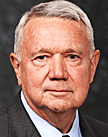Mayor Lee Leffingwell lifts idea for citizens to draw council districts and undercut opposing proposition

On Wednesday Mayor Lee Leffingwell’s automated telephone calls rang the phones of thousands of Austin voters to criticize the Independent Citizen Redistricting Commission for City of Austin that’s part of Proposition 3’s 10-1 plan for electing council members from geographic districts. (More about the transcript of that call later.)
Today, the mayor held a noon-hour press conference at City Hall to propose his own version of a “Citizens Committee to Review Redistricting” that would be used if Proposition 4’s 8-2-1 plan passes and gets more votes than the Proposition 3 plan put on the ballot through a petition drive led by Austinites for Geographic Representation (AGR).
The chief difference between the two redistricting proposals is that Prop 3’s Independent Citizens Redistricting Commission would draw council districts the City Council would have no choice but to adopt.
The mayor’s proposed committee would only be advisory and the City Council would be able to reject, revise, or adopt the committee’s recommendations.
Regardless of which method is used to draw council districts, the maps must be drawn in accordance with the U.S. Constitution and must pass muster with the U.S. Department of Justice in accordance with the Voting Rights Act of 1965 before implementation.
Leffingwell’s concept would have to be approved by a majority of the council members and enacted via a city ordinance. This or any future council majority would be able to cancel the ordinance at any time.
Prop 3’s Independent Citizens Redistricting Commission would be incorporated into the City Charter, which can only be changed by Austin voters in an election called for that purpose. No City Charter election may be held until at least two years have elapsed since the most recent charter election. Which means that no future City Charter election could be held until November 7, 2014.
Mayor’s press conference statements
“Should Prop 4 be successful and adopted into the City Charter, I will propose and push for a citizens’ committee to investigate and review municipal redistricting methods and best practices in order to provide recommendations for Council approval,” Leffingwell said, reading from a prepared statement (Mayor Lee Leffingwell, Fred McGhee Statements Nov. 2, 2012.)
“This committee will look at redistricting methods in other cities, best practices, and the recommendations of a wide range of experts and community members through an open and public process. I believe this is the only way to come up with a method that is fair and fits the needs of our City.
“I want to note that this process will provide what the Prop 3 independent redistricting commission proposal does not—a fair and open public vetting of the best options in redistricting methods with considerations such as reasonable budgets for such an effort, a wide range of expert opinions, and a fair opportunity for all of thecitizens of Austin to participate in this review.”

Attorney Steve Bickerstaff drafted Prop 3’s plan for an Independent Citizens Redistricting Commission, modeled on a plan enacted by popular vote for the State of California and used in that state’s most recent redistricting. On September 24, The Austin Bulldog published Bickerstaff’s in-depth article, which is slated for publication in an election law journal. That article includes an exhaustive survey of independent redistricting commissions already being used in the United States and points out problems in cities that allow councils to draw or approve districts.
Bickerstaff, who has represented more than 100 jurisdictions on redistricting matters, said the mayor’s proposal is flawed for two reasons.
“There is no problem if the voters approve such a commission by adopting a change to the charter, but I doubt that a city council can legally create an autonomous commission on its own,” he said.
“The second potential problem is that, if a city council can lawfully create such a commission, it can also disband it. In other words, if a future city council does not like a commission’s redistricting plan, it can undo it. The commission is not truly independent.”
Bickerstaff noted that is exactly what happened in Los Angeles, Chicago, and Dallas.
As Bickerstaff wrote in the September 24 article, in Los Angeles, the 2011 map was criticized as “ugly” and “dysfunctional” because of city politics, according to the Los Angeles Times.
In Chicago, the city’s recent redistricting process was described by the Chicago Tribune as “quintessential Chicago politics” that occurred “behind closed doors” with the emphasis on “incumbent protection.”
The Dallas Morning News was similarly critical of that city’s 2011 process, observing, “Racial politics and self-preservation got in the way of good decision-making. Deals were cut behind closed doors. And a slapped-together, gerrymandered map that protects incumbents and shortchanges Latinos was the result.”
“These comments about Los Angeles, Chicago and Dallas reflect the public cynicism that generally exists about redistricting in major cities when the city council draws its own council districts,” Bickerstaff’s article states.
McGhee also slams Prop 3 plan

Fred McGhee, PhD, was a member of the 2012 Charter Revision Committee who voted on the losing side of the narrow 8-7 vote to recommend the 10-1 plan to the City Council.
At the press conference, McGhee read from a prepared text his five reasons that he said shows the Citizens Independent Redistricting Commission that’s part of Prop 3’s 10-1 plan is flawed.
McGhee said the method of selecting people to serve on the Citizens Independent Redistricting Commission is, “highly restrictive” and that it leaves out over “93 percent of Austinites” from qualifying to be on it.
He said the language contains “confusing provisions requiring elections in May until 2016. This may be a problem if Props 1 and/or 2 pass, requiring November elections.”
McGhee pointed to what he called the “vague qualification requirements” to serve on the committee include “analytical ability” that aren’t quantifiable and could be used to disqualify Austinites unfairly from being considered.
He claimed the plan was “poorly designed” and based on the California model, a bad fit because California is a state with partisan elections and a huge pool of potential candidates for their commission, while Austin is a city with non-partisan elections and a very small pool of potential candidates.
Finally, McGhee said, the district map drawn by the “will be final with no ability for anyone to review it and change it, even if it tears apart neighborhoods or is in others ways objectionable to the citizens of Austin.”
Bickerstaff’s response to McGhee
As to the number of people eligible to serve on the Citizens Independent Redistricting Commission, Bickerstaff said the number is already sufficient but will increase dramatically with elections held this month and the plan for Austin was altered for the nonpartisan election process used to elect our mayor and council members.
The plan contains a provision to accommodate moving elections to November. “If the date of the city election is moved, then the dates in this article shall be adjusted to ensure the commission has sufficient time to draw the lines prior to the election date,” states paragraph 3(B) of the ordinance placing the measure on the ballot. (See Proposition 3: Ordinance No. 20120802-015.)
The instructions for how the Citizens Independent Redistricting Commission will draw districts specifically addresses McGhee’s concern about “tearing apart neighborhoods.”
“Districts shall be geographically contiguous. The geographic integrity of any local neighborhood, or local community of interest shall be respected in a manner that minimizes their division to the extent possible without violating the requirements of” the U.S. Constitution and the federal Voting Rights Act, according to paragraph 3(E) of the ordinance.
McGhee’s criticism that maps drawn by the Citizens Independent Redistricting Commission will be final is correct. But, as stated in paragraph 3(K)(7) of the ordinance, “The commission shall establish and implement an open hearing process for public input and deliberation that shall be subject to public notice and promoted through an extensive outreach program to solicit broad public participation in the redistricting public review process. (Numerous additional public hearing details are included.)
What McGhee sees as a negative—that the Commission’s map may not be changed by the City Council—the Proposition 3 proponents see as an advantage, in that it prevents the council from gerrymandering districts to anyone’s advantage or disadvantage.
Robo-call flubs web address
Leffingwell’s Wednesday afternoon automated phone call (see Transcript of Mayor Lee Leffingwell’s robocall script Oct. 31, 2012) was recorded on the answering machine of AGR volunteer Ed English.
English played the recording for The Austin Bulldog.
Here’s what the mayor said:
“This is Mayor Lee Leffingwell, asking you to oppose the blank check signed by Austin taxpayers that’s hidden inside Proposition 3.
“Prop 3 creates a new redistricting commission that could spend millions of tax dollars without any constraints either by city management or by your elected representatives. This money would be spent directly out of our city budget on consultants and lawyers.
“Please don’t give an unelected commission an open checkbook.
“Vote for financial accountability and vote against Prop 3.
“For more information call 512-926-0165 or visit Fair Austin.org.”
The phone number rings at the home of Prop 4 political consultant David Butts.
Prop 4’s actual website is at www.fairdistricts.org.
Prop 4 political consultant responds
A notable fact about the mayor’s statement is that it says nothing about Proposition 4—the 8-2-1 plan he and four other council members voted to put on the ballot, after the 10-1 plan petition was already approved by the city clerk and the council had put it on the ballot.

In response to that observation about the mayor not mentioning Prop 4, political consultant David Butts told The Austin Bulldog, “That’s correct,” but added, “You don’t have enough time in 30 seconds” (to say everything you’d like).
As for the negative tone of the message, Butts said, “We’ve had enough of turning the other cheek. (Proposition 3 proponents) came out with some pretty outlandish charges, which is typical of campaigns. They obviously feel that truth, justice, and the American Way is on their side—and everyone else is evil.
“We just pointed out what we thought was a flaw,” Butts added. “(The redistricting commission) can spend money and there is nothing the council can do to restrict their funding, short of public condemnation. I don’t know of any other agency with that power.”
Butts said the Prop 4 campaign for the 8-2-1 plan is being outspent four to one and doing what it can with available funds.
Asked if the Prop 4 campaign was getting any “late money” to pour into a last-minute effort, Butts said, “Definitely, but nothing to write home about, not enough to change the direction we’re headed in.”
As The Austin Bulldog reported September 29, AGR raised $123,851 through the September 29 reporting period, and had $13,856 left on hand. Austin Community for Change, the proponents of the 8-2-1 plan, had raised just $19,192 and had $1,227 left.
Thus, AGR had raised more than six times as much as AC4C, but had the advantage of starting late last year while in a petition drive. AC4C didn’t start raising money until July. You may read our story on fundraising by these two campaigns and access their campaign finance reports in our story, Prop 3 Fundraising Outpaces Prop 4.
This report was made possible by contributions to The Austin Bulldog, which operates as a 501(c)(3) nonprofit to provide investigative reporting in the public interest. You can help to sustain The Austin Bulldog’s coverage by making a tax-deductible contribution.
Related Bulldog coverage: This is The Austin Bulldog’s 37th article covering issues and activities pertaining to proposed changes to the Austin City Charter.
Prop 3 Fundraising Outpaces Prop 4: Financial support for 10-1 far outstrip dollars donated for 8-2-1 hybrid, September 29, 2012
Prop 3 Proponents Question Prop 4 Legality: Civil rights attorney and two minority groups say federal preclearance for 8-2-1 is unlikely, October 21, 2012
Poll Triggers Backlash from 10-1 Proponents: Proposition 3 advocates saying Prop 4 playing dirty with a misleading poll, Prop 4 denies the charge, October 17, 2012
Proposition 4 Campaign Reports Finances: Late report indicates $2685 raised in last three months but fails to provide details about campaign expenses, October 10, 2012
Proposition 3 Campaign Reports Finances: 10-1 campaign proponents raised more than $40,000, Proposition 4’s 8-2-1 advocates’ report not submitted, October 9, 2012
Proposition 3 Rally Draws 150-200 People: Crowd hears fiery speeches by proponents of the 10-1 systemfor electing council members, October 8, 2012
Feisty Debate Over Electing Council Members: One panelist argues for no change to the at-large system of City Council elections, October 4, 2012
Proposition 3 and 4 Proponents Rev Their Campaigns: Raising money, organizing troops, and pushing plans for geographic representation on Austin City Council, September 28, 2012
Redistricting Need Not Be a Quintessentially Political Process: Independent redistricting commissions for U.S. states and cities, September 24, 2012
Barrientos Lampoons Prop 4 With a Fable: Other proponents of alternative plans for geographic representation push their points, September 14, 2012
Proposition 3 Advocates Falsely Accuse RECA: Group alleges ‘rumor’ of $100,000 pledge by Real Estate Council to defeat Proposition 3, but RECA says not so, September 12, 2012
No-Change Option Surfaces in Ballot Debate: Former Council Member Bob Binder opposes both options on the ballot for geographic representation, September 11, 2012
The Election Wars Have Begun: Interest in how council members elected running high, as face-off debates abound, September 9, 2012
8-2-1 Near Certain to Go on Ballot: City Council Votes on Second Reading to Put Competition Election Plan on Ballot, July 31, 2012
Hard Fought, Heartfelt Charter Decision: Charter Revision Committee Votes 8-7 to Back 10-1 Plan for Council Elections, February 3, 2012
New Restrictions Proposed for Lobbyist Fundraising: Lobbyists Can Only Give Candidates $25 But Can Collect Unlimited Contributions For Them, January 22, 2012
Committee Debates How to Elect Council: Charter Revision Committee Divided Over Pure Districts vs. Hybrid System, January 9, 2012
Thirteen Charter Changes and Counting: Charter Revision Committee’s Next Job: Tackle Plan for Geographic Representation, December 14, 2011
Council Confirms November 2012 Election Date for Charter Amendments: Resolution Ensures Citizens Initiative Won’t Force May 2012 Charter Election, November 3, 2011
Coalition Launching Petition Drive to Get on the Ballot for May 2012 Election, October 18, 2011
Broad Community Interest Focusing on How Mayor and Council Members Elected, October 4, 2011
Coalition Nearing Petition Launch for Grass-roots Council District Plan, August 24, 2011
Maps Prove Select Few Govern Austin: Forty Years of Election History Expose Extent of Disparity, August 4, 2011
Petition Launch Imminent to Force Election for Geographic Representation in City Elections, March 7, 2011







